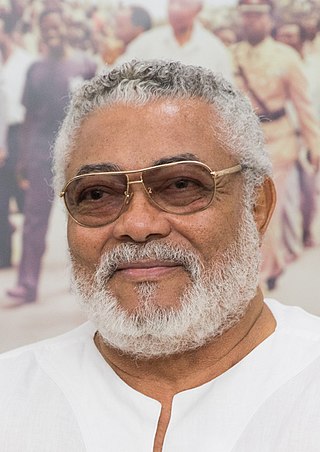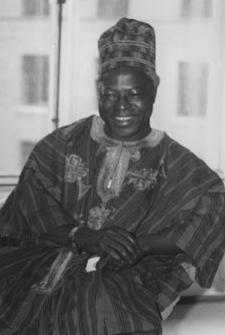Related Research Articles

The New Patriotic Party (NPP) is a centre-right and liberal-conservative political party in Ghana. Since the democratisation of Ghana in 1992, it has been one of the two dominant parties in Ghanaian politics, with its leading rival being the centre-left National Democratic Congress (NDC). John Kufuor of the NPP was President of Ghana from 2001 to 2009. At the elections held on 7 December 2004, the party won 129 out of 230 seats. The NPP candidate was Kufuor, who was re-elected as president with 52.75% of the vote. The New Patriotic Party symbol is the African elephant and the New Patriotic Party colours are red, white, and blue.

Jerry John Rawlings was a Ghanaian military coup leader, aviator and politician who led the country for a brief period in 1979, and then from 1981 to 2001. He led a military junta until 1992, and then served two terms as the democratically elected president of Ghana.

Hilla Limann, was a Ghanaian diplomat and politician who served the President of Ghana from 24 September 1979 to 31 December 1981. He served as a diplomat in Lomé, Togo and Geneva, Switzerland.
Every Ghanaian Living Everywhere (EGLE) is an inactive political party in terms of elections in Ghana. It has not contested any elections since the 2004 Ghanaian general election. According to Ghanaian law, political parties must have a presence in all districts in order to remain registered, but due to lax enforcement, EGLE remains registered as a party as of 2019.
The National Convention Party (NCP) is a political party in Ghana that existed between 1992 and January 1996.

The National Democratic Congress (NDC) is a social democratic political party in Ghana, founded by Jerry Rawlings, who was Head of State of Ghana from 1981 to 1993 and the President of Ghana from 1993 to 2001. Following the formation of the Provisional National Defence Council (PNDC), which ruled Ghana following the military coup d'état on 31 December 1981, there was pressure from the international community to restore democracy. The NDC was formed as the ruling party ahead of elections in 1992, in which Rawlings was elected president, and in 1996 Rawlings was re-elected as the NDC candidate. Rawlings' second term ended in 2001.

The Parliament of Ghana is the legislative body of the Government of Ghana.

The Third Force Party (TFP) was a political party in Ghana during the Third Republic (1979–1981).
Victor Owusu was a Ghanaian politician and lawyer. He served as Attorney General and Minister for Justice on two occasions which were under the NLC and then Busia regime and also became Minister for Foreign Affairs under the Busia regime. He was the Popular Front Party's presidential candidate for the 1979 Ghanaian general election.

Parliamentary elections were held in Ghana on 29 December 1992, the first since 1979. Voter turnout was just 28.1% amidst a boycott by opposition parties, who had claimed the preceding presidential elections in November – won by former military ruler Jerry Rawlings with 58% of the vote – were fraudulent, with international observers considering them not to have been conducted in a free and fair manner.
Joseph Henry Mensah was a Ghanaian politician and economist.
Nii Okaidja Adamafio is a Ghanaian politician. He was the Minister of the Interior in the Rawlings government from 1997 to 2001. He was the first Member of Parliament from 1997 to 2001 in the Odododiodoo constituency.

The mass media in Ghana, includes television, radio, internet publishing and newspapers.

Nana Konadu Agyeman-Rawlings is a Ghanaian politician and the widow of former President Jerry Rawlings, under whose capacity she served as the First Lady of Ghana from 4 June 1979 to 24 September 1979 and from 31 December 1981 to 7 January 2001. In 2016 she became the first woman to run for President of Ghana. In 2018, she launched her book titled It Takes a Woman.
Imoru Ayarna was a Ghanaian businessman and politician. He was the founder and leader of the erstwhile People's Action Party in Ghana.

Henry Romulus Sawyerr, was a Ghanaian politician and surveyor. He was Minister for Education from 1993 to 1997 in Jerry Rawlings' first presidential term of office, under the Fourth Republic. In the Second Republic, Sawyerr was Member of Parliament (MP) for Osu-Klottey as a non-party candidate. In the Third Republic, he was again elected MP but gave up the seat to be in Hilla Limann's cabinet as Minister for Transport and Communications from 1979 to 1981.
Alhaji Mahama Iddrisu is a Ghanaian politician who was a member of the Provisional National Defence Council and a former Minister for Defence. He is a founding member of the National Democratic Congress. He is the longest-serving Minister of Defence of Ghana, serving from 1985 to 1999, for 14 years.

Samuel Nuamah Donkor was a Ghanaian politician and social worker. He was a Minister for Health, Minister for Ashanti Region and a member of the first parliament of the fourth republic of Ghana representing New Juaben North constituency under the membership of the National Convention Party (NCP).

The Political history of Ghana recounts the history of varying political systems that existed in Ghana during pre-colonial times, the colonial era and after independence. Pre-colonial Ghana was made up of several states and ethnic groups whose political system was categorized by 3 main administrative models; Centralized, Non-centralized and Theocratic states. In the colonial era, the British Empire employed different forms of government among its four territorial possessions in the Gold Coast. Indirect rule was implemented in the late 19th century after its success in Northern Nigeria. From the 1940s, native Ghanaians yearned for more autonomy. This resulted in the several constitutional reforms as well as the creation of the office of the Prime Minister in 1952.
References
- ↑ Express, Anthony Obeng Afrane/Daily. "Gone too soon!!!". Modern Ghana. Retrieved 2023-02-09.
- ↑ Daniel Miles McFarland, 'THIRD FORCE (TF)', Historical Dictionary of Ghana, Scarecrow Press, 1995, p. 171
- ↑ 'Rawlings sued over nationality ', The Independent , 9 October 1992